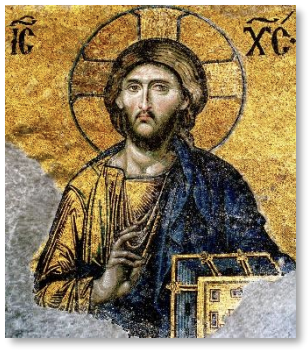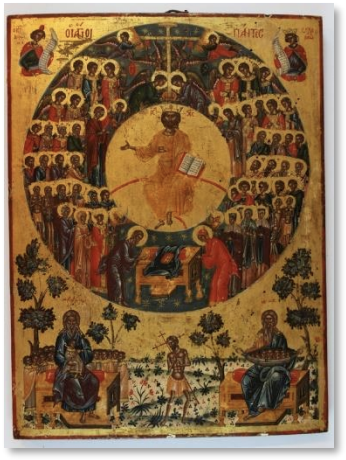The Scriptures of Israel
To simply begin our discussion with the topic of Jesus Christ as the center of our Orthodox faith is like joining a conversation midway through. The context of the beginning of the conversation is lost and incomprehension duly follows. Jesus Christ did not appear to mankind without a long introduction. This long introduction is seen in the history of God’s interactions with mankind that are described in the Old Testament. These interactions are seen in the lives of the Patriarchs Abraham, Isaac, and Jacob, the giving of the Law and the form of the tabernacle to Moses, the institution of the priesthood given to Aaron and the tribe of Levi, the calling of the prophet Samuel, the installation of the shepherd boy David as King of Israel, the blessing of Solomon to build the Temple, and the raising up of prophets to warn and guide Israel. We must also not forget the importance of the Psalter as the prayer book of Israel or the importance of the distillation of wisdom found within the various books of Wisdom.
The Old Testament documents the preparation for the coming of the Christ. For it is in God’s guiding, forming, and even rebuking of Israel that we begin to see the necessary outlines of who Jesus Christ is and what He fulfilled. For example, we would not understand the depth of the kingship of Christ without understanding the Davidic kingship and the previous chaos of Israel during the time of the Judges and the failures of King Saul. We would not understand the perfect sacrifice and high priesthood of Jesus Christ without the details of Leviticus or the failures of Hophni and Phinehas (1 Sam 2:12 - 4:11). Nor would we begin to comprehend the prophetic actions and words of our Lord without the long lineage of prophetic actions and voices of Nathan, Isaiah, Ezekiel, Jeremiah, Amos, and many more. St. Paul refers to the Law as given to us as a paidagogos, meaning a tutor or guardian, to Christ (Gal 2). The life of Israel, its institutions of priesthood, temple, law, and prophecy teaches, informs, and brings us to the feet of our Lord and Teacher, Jesus Christ.

Not only do the scriptures of Israel prepare and lead us to more fully understand Jesus Christ, but they are fulfilled and mystically unlocked by the Messiah. The preaching of the early Church was captured in the Book of Acts and underlines for us that in the life of Jesus Christ, especially in the events around his death and the holy resurrection, the scriptures find their fulfillment. What does it mean that the scriptures were fulfilled by Jesus Christ? In short, it means that in Jesus Christ, the communion which Adam and Eve had with God — but lost — is returned to humanity through Jesus Christ. In Jesus Christ, we receive the Kingdom of heaven, the remission of sins, and reentry into the garden of paradise. In Jesus Christ we find, for the first time, a truly human life lived in full communion with the Father. In Christ’s truthful speech and acts, his rightly governed life free of sin, and his faithful adherence to the Father even to the point of death, even death on a cross, turns back the consequence of Adam and Eve’s failures.
How are the Scriptures mystically unlocked? The confession of the Christian faith is that the true message of the Old Testament Scriptures is found within Jesus Christ. We see this clearly in the Apostolic preaching in the Book of Acts through the speeches of St. Peter, of the Protomartyr and Deacon Stephen, and of St. Paul (Acts 2, 7, and 13). The challenge is that Jesus is not immediately recognizable as the promised one. This is entirely the dynamic of the Gospels, that the light has come into the world, but it is not recognized or understood (John 1). St. Paul talks about this dynamic in his second epistle to the Corinthians (2 Cor 4:3-4). There he talks about a “veil” that remains over the eyes of the children of Israel in their reading of the Scriptures. They are blind to the Messiah because their reading of Moses and the prophets does not allow them to see Jesus Christ. It is only in turning with an open heart and mind to the Lord that the veil drops, and the form of Jesus Christ is discernible within the scriptures. It is like someone who is struggling deeply with a particular problem, and they have come up with no solutions until a suggestion comes that suddenly puts all things in a different light and now makes complete sense of the problem. Jesus Christ is the answer and fulfillment of Scripture that shines forth once one adjusts one’s vision according to his teaching, life, death, and resurrection.
We see this very clearly in the account of the resurrected Christ walking on the road to Emmaus with Luke and Cleopas (Luke 24:13-35). As Jesus approaches them, they do not recognize him. As they discuss the events in Jerusalem, Luke and Cleopas display knowledge of the events of the life, death, and resurrection of Jesus Christ but do not understand their meaning. Jesus responds to their lack of understanding pointing to the necessity of the suffering of Christ and his entering into glory through an explanation based upon Moses and all the prophets. The unveiling of Luke and Cleopas' eyes is not fully accomplished until Jesus breaks bread and blesses it, breaks it, and gives it to them. With this movement, from the explanation of the scriptures to the table of sacrifice, which we also do in every Divine Liturgy, the eyes of Luke and Cleopas are opened. Christ is made known to them in the breaking of the bread.
With the advent of our Lord, the scriptures find their fulfillment. Our Lord provides the true context from which we are to understand the scriptures. This question of the nature of the veil covering the eyes of the Jews is not one of sloppy, ignorant, or lazy reading. The advent of our Lord and his working out of our salvation was a mystery prepared before the “foundation of the world." In the light with which He provides, we find ourselves able to see within the scriptures a new depth. In gaining and assimilating ourselves to the mind of Christ, we receive sight for the spiritual wisdom which can only be given to us through Jesus Christ. As our Lord tells us, he did not come to abolish the law, but to fulfill it (Matt 5:17).

This approach to the scriptures sets the entire agenda for how the holy Fathers of the Church approached and interpreted the scriptures. Building upon the apostolic teachings of the New Testament, especially of St. Paul and St. John, the Fathers of the Church draw out for us deep spiritual truth from the Old Testament. They did not engage the Old Testament as a source of moral stories for our general edification or as a collection of a few obvious verses or prophecies which foretell the coming Messiah. Rather, the Fathers of the Church find within the entirety of the Old Testament the outline and content of Jesus Christ. They also discover the Theotokos, the Mother of God, and her role in our salvation, as well as the glory of the Messianic age as found within the bosom of the Church. For the mystery of Jesus Christ is not simply a message of Jesus as Lord and King, but of the entirety of the court of our King, His Mother and the friends of God, the holy ones, the saints. Is this not deeply evident within the Book of Revelation? Or, as enshrined within the Church’s use of Scripture as found in the Akathist to the Mother of God? We shall touch on some of these points in more detail below.
In the spirit of the Fathers, and in fidelity to their teaching, we will proceed with our sketching of the scriptures and their place in the Church with a deep dive into the loss of paradise in the sin of Adam and Eve. In attending to the specifics of how Adam and Eve fell, we can find in miniature the failure of Israel, and even of ourselves. We find in the failures of Adam and Eve a sketch of the basic reasons as to why God raised up priests, prophets, and kings in Israel. This in turn allows us to more fully understand Jesus Christ, the second Adam, as the king, the high priest, and the true prophet of the Most High God. It will also open our eyes to Orthodox worship’s deep biblical roots.
Read more: Law (opens in a new tab), History (opens in a new tab), Wisdom (opens in a new tab), Psalms (opens in a new tab), Prophets (opens in a new tab), Intepretation (opens in a new tab), The Fathers (opens in a new tab)